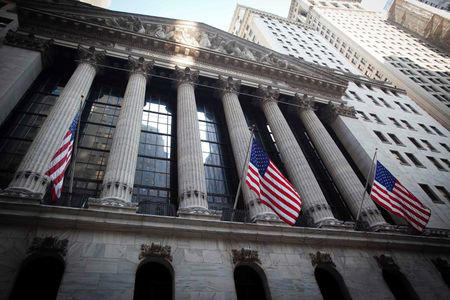In evening trading on Wednesday, U.S. stock index futures experienced a decline, reflecting the broader trend seen on Wall Street. Uncertainty surrounding an upcoming inflation report and cautionary statements from Federal Reserve officials contributed to increased risk aversion among investors.
Concerns persist that persistent inflationary pressures could prompt the Federal Reserve to maintain higher interest rates for an extended period. Several Fed officials reiterated this sentiment on Wednesday, emphasizing the need for further efforts to address inflationary concerns.
S&P 500 Futures dropped by 0.2% to reach 5,072.50 points, while Nasdaq 100 Futures also declined by 0.2% to 17,875.00 points as of 18:11 ET (23:11 GMT). Dow Jones Futures followed suit with a 0.1% decrease, reaching 38,939.0 points.
The downward trend in U.S. stock futures follows a day of losses on Wall Street, where tech stocks led the decline. Investor sentiment was influenced by profit-taking activities following the recent surge in indexes, particularly fueled by excitement surrounding artificial intelligence developments.
Concerns regarding stretched valuations, particularly in the technology sector, have become more prominent this week, contributing to the subdued performance of U.S. stock benchmarks. Throughout the week, the market has largely maintained a flat-to-lower range, reflecting cautious sentiment among investors.
On Wednesday, the S&P 500 closed down by 0.2% at 5,069.76 points, while the NASDAQ Composite fell by 0.6%, concluding the session at 15,947.74 points. The Dow Jones Industrial Average also experienced a slight decline, dropping by 0.1% to 38,949.02 points.
PCE data in focus as Fed officials flag sticky inflation
As markets awaited the release of the Personal Consumption Expenditures (PCE) price index data, which serves as the Federal Reserve’s preferred measure of inflation, investors sought additional insights into the trajectory of inflation and its potential impact on interest rates.
The upcoming PCE price index data, scheduled for release later in the day, is for the month of January. This data release follows a previous consumer inflation reading for the same month, which surpassed expectations, indicating elevated inflationary pressures.
Against this backdrop, Federal Reserve officials continued to sound warnings regarding persistent inflationary trends, signaling reluctance towards initiating early interest rate adjustments. Both New York Fed President John Williams and Atlanta Fed President Raphael Bostic reiterated on Wednesday the need for further measures to address inflation and bring it back in line with the central bank’s 2% annual target.
Additionally, a second reading on fourth-quarter GDP data revealed that the U.S. economy continued to exhibit strong growth, indicating a relatively robust economic environment. This sustained economic momentum contributes to the heightened outlook for inflation in the upcoming months, further emphasizing the challenges faced in managing inflationary pressures.
Q4 Earnings Season Winds Down Under Mixed Results
The conclusion of the fourth-quarter earnings season brought a mix of outcomes, contributing to negative trading signals for Wall Street.
HP Inc (NYSE:HPQ) experienced a 3% decline in aftermarket trading as its quarterly revenue failed to meet expectations. However, the company reported improved earnings driven by better margins.
Meanwhile, cloud company Snowflake Inc (NYSE:SNOW) witnessed a substantial 20% decline after its first-quarter product sales guidance fell short of estimates. This decline reflects ongoing challenges amidst stiff competition within the cloud computing sector.
Conversely, C3.ai Inc (NYSE:AI) saw a notable 13% jump following its announcement of quarterly revenue that exceeded consensus estimates. Similarly, Duolingo Inc (NASDAQ:DUOL) experienced a significant surge of 21%.
On the flip side, DoubleVerify Holdings Inc (NYSE:DV) faced a downturn of 19% due to weak annual guidance, signaling challenges ahead for the company.
